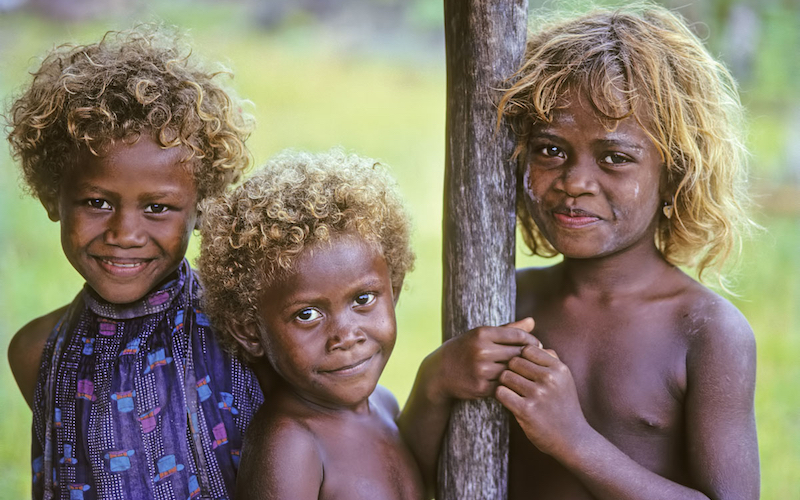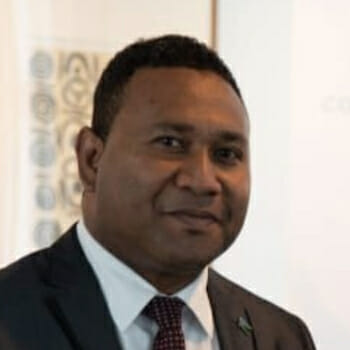
Unity in Diversity, a Hope for the Solomon Islands
The Solomon Islands is one of the most unique countries in the world. It consists of nine Provinces each with many smaller islands and with people of different ethnic and cultural backgrounds. They called us Melanesians but we are also Micronesians and Polynesians. Our Pacific Country is home to all the three Pacific Races. They called us Islanders, but some people spend most of their lives in the upper mountains. In short, the Solomon Islands’ diversity is derived from our beautiful islands, our natural resources, our different cultures, different dialects, different races of peace loving people and our colorful corals and sandy beaches.
Nation building in the Country is progressing but in a unique way. It unfolds like the tide, the winds and the waves. It is very slow when the wind does not blow, and moves faster when the situation is favorable. The situation here is the tendency to make things happen according to the navigators, but as more than 80 percent of our rural people would say, life is what we define in the bushes, near the coasts, up in the mountains or down in the valleys. From a distance, life in the different Islands within the Solomon Islands is not the same, it’s very dissimilar.
If we gauge the sociological argument that the Solomon Islands has championed diversity in its genetic makeup, we might question the issue of stability among or within its diversity. Karl Marx’s Class Theory is void in societies like the Solomon Islands as is the Western notion that the means of production and capitalism will be embraced by the Bourgeoisie, and the Proletariats as their subordinates.
In the Solomon Islands, wealth is justified commonly in three ways, money, property, and identity. Karl Marx’s argument can fit in with the first two however it does not cover the third one. The land tenure system in the Solomon Islands is owned by tribal identification (a group of people belonging to a same tribe), therefore if 80 percent of rural dwellers have allegiance towards their Patrilineal or Matrilineal tribes, their measurement of wealth will be subject to what their tribe owns, such as land and natural resources. In some ways, we refer to this as the hidden wealth, the very force behind an inner stability between the upper and the lower class people in any society as alluded to by Karl Marx.
Secondly, the idea of Rationalization as argued by Max Weber retains stability in our nation’s diversity. Striving to achieve the best result is everybody’s goal, but in the Solomon Islands, our efforts are more unique because each individual has the choice to strive either in the Public Sector, the Private Sector or in the Personal Sector. In the Public and Private Sector, Rationalization leads to higher competition for a scarce resource, and individuals tend to be Slaves of the System. However, The Personal Sector is more interesting because people become Masters of themselves in their means of production. They own their lands and resources and they strive according to their own goals, limitations and satisfaction. For them, ideas, capital and labor are paramount. Likewise, they compete against their own ability, strength and capacity. If for instance a government officer earns 10 dollars a day, and a villager selling sawn timbers earns roughly 300 dollars a day, then the balance of economic power advantages the latter, meaning the competition for a common public good lessens, thus lessening also the probability for competition, conflict and instability in the society.
Further, Weber’s analysis on Social Action with regards to human relations has enabled a breathing space for stability in the Solomon Islands. The very foundation of Solomon Islands societies is the communal ethics of family relationship. People link history to present family bonds, and they trace family linkages to ancestral ties. The recognition of humanity through both extended and immediate ties outside of tribal identification enhances solidarity and respect for one another. It goes to the extent of promoting a common sense of blood relations between people living in different Islands/provinces but who have a common family root in history. As Weber argued, people’s actions and engagement is motivated by how they subjectively relate to one another, and this makes family ties more significant in contributing to unity, peace and stability in the country.
The emergence of Nation Building enabled our societies to build bricks on the foundations laid by our Independence, but there are bricks of many sizes. We just need the right mixture of sand and cement and an amount of mortar to smooth the overlaps created by the different heights and lengths of the different brick sizes. This connotation is the best available approach to absorb such a huge diversity of realities in the country. And this can be the anti-thesis to our defined Independence. I tend to adopt the thoughts of Ralf Darendolf and his classical Sociological work on Conflict Theory. Darendolf argued that we need Consensus to create Conflict, meaning Conflict becomes the anti-thesis needed for a Synthesis. For the Solomon Islands, the never waning Change Agenda remains our foreseen synthesis. The renewed assurances that a step forward must not lead us backwards is a philosophy and challenges our country’s progress through the synthesis. This means that stability is not threatened however it is elevated through an examining approach that is slowly accelerating but is conducive for such a diverse environment.
Finally, the Solomon Islands is a religious oriented country where almost 99 percent of its population is Christian. Coming from that perspective, it is arguable to say that sociology of religion grips diversity for a common purpose and that is oneness, an identity within a religious belief that puts everyone under one spotlight which is Christianity. It confines individuals to what Talcot Parsons refers to as Symbolism, a centered icon that drives motives and actions to some certain extent limitations. Having a shared obligation under Christian teachings and principles grooms people towards a common point, stewardship and followership, enabling the masses to do right and to feel obliged against the concept of Sin. These further mold individuals to counter and stand against the Subjective Phenomena such as negative feelings/motives etc. which Emile Durkheim would refer to as Objective Social Facts, giving options of thoughts before a negative action is done, thus lessening the probability of doing things the other way which do not represent the expected norms and values of our society.
From the evolutionary thoughts of Charles Darwin to the predictions of Thomas Malthus on population and resources, Solomon Islands society will continue to evolve according to its genetic makeup. Its diversity will continue to be the subject; however the compliments it provides set the basis for increased stability, engagement, integration and progress.
In a research article titled “The Origin of Mysterious, Dark-Skinned Blonds Discovered” Stephanie Papas discovered that the Solomon Islands is a country having dark skinned people with blond hair. One can add that Solomon Islands also have original fair light skinned Melanesians with blond hair, a human species rarely seen in other countries. A portion of our uniqueness was made known to the world. However we represent more, the countless blessings of who we are. We are a country of many Nations, we are a State of many Nation States, we are a United Nations of our own, and we are unique because the term “UNIQUE” was created to define who we are, our uniqueness, our blue oceans, our green heritage, our sunshine, our identity, our oneness, our Mela-Micro-Poly, our Unity in Diversity, our beautiful and beloved Solomon Islands.

